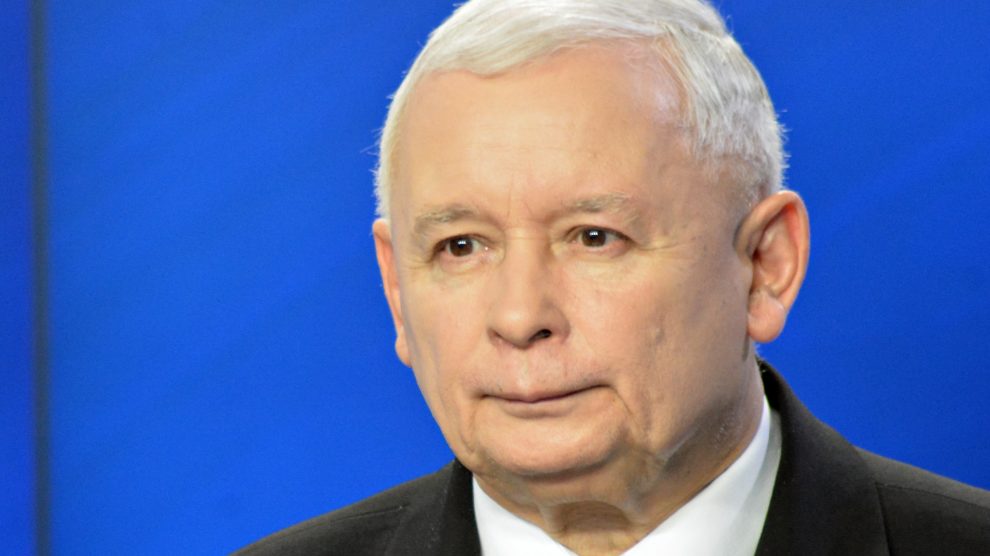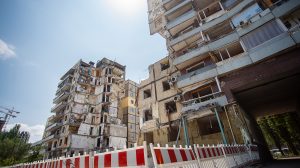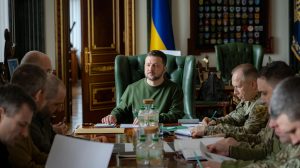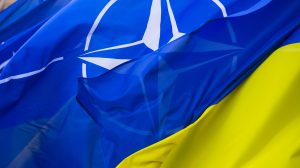Central Europe
Jarosław Kaczyński, Poland’s deputy prime minister and leader of the ruling Law and Justice party (PiS), this week said that there would be no “Polexit”, but added that Poland wanted to remain a sovereign state. “There will be no Polexit – it is propaganda that has been used many times against us… We want to be in the EU, but at the same time we want to remain a sovereign state,” Kaczyński told the Polish Press Agency. “We want what is contained in the [European Union] treaties to be strictly respected. There are exclusively EU competences, in particular those relating to external relations in the economic sphere, there are mixed competences and those which remain solely within the competence of the state.”
Bulgaria is to hold its third parliamentary election of the year in November after the largest three parties in parliament failed to find common ground for a coalition government. Bulgarian President Rumen Radev said on Saturday that the vote will be held on November 14, the date already set by lawmakers for the scheduled presidential election. He said holding the two votes together will save public money and voters’ time. Radev, who will be seeking a second term in office in the presidential vote, said that he will dissolve parliament and appoint a caretaker government. “It is obvious that the two campaigns will be taking place at the same time and will merge. I will count on the support of all respectable Bulgarians on the big issues — the fight against poverty and injustice,” he told reporters.
Hungary’s media regulator published guidelines for broadcasters to comply with new LGBT laws on Wednesday, relegating some films portraying homosexuality or gender identity issues to the same age group restrictions as gory horror movies. Publication of the guidelines follows the June adoption of a law banning the “display and promotion of homosexuality” among under-18s despite criticism from rights groups and the European Union. The new guidelines do not ban the portrayal of homosexuality or gender issues outright and do not affect the age classification of films in which these subjects are not considered a “defining feature”. But programmes depicting what the regulator called the virtues, uniqueness of benefits of homosexuality or change of gender would deserve a higher age rating, it said.
Pope Francis has taken a new revolutionary step, by condemning those who used the name of God to commit cruel acts against believers in other faiths, such as the Jews during the Holocaust. In Slovakia on Tuesday, the pontiff warned the faithful about any superficial use of the crucifix. “Let’s not reduce the cross to an object of devotion, much less to a political symbol, to a sign of religious and social status,” Francis said. He then moved on to the far east of Slovakia to meet with the country’s Roma in a gesture of inclusion for the most socially excluded minority group suffering discrimination, marginalisation and poverty. Francis acknowledged Slovakia’s Roma had long been subject to “prejudice and harsh judgments, discriminatory stereotypes, defamatory words and gestures,” and even misunderstandings on the part of the Catholic Church.
Czech President Miloš Zeman was hospitalised on Tuesday while predecessor Václav Klaus was undergoing tests at the same hospital. The presidential office didn’t immediately comment on Zeman’s hospitalisation, which was confirmed by Prague’s military hospital. Further details weren’t immediately given. An adviser to Zeman told Czech public radio that he was there for a regular check. Zeman, 76, is a heavy smoker who has suffered from diabetes and neuropathy linked to it. He has trouble walking and has been using a wheelchair. Klaus was also admitted to the same hospital Tuesday to undergo unspecified tests. He spent time at the hospital last weekend because of high blood pressure, his spokesman told Czech public television. Klaus, 80, a vocal opponent of the coronavirus restrictions, fell ill with Covid-19 in February but didn’t need hospitalisation.
A powerful anti-fascist film which was seized by the Nazis and thought to have been lost forever is to receive its world premiere at the London film festival. The 1931 film Europa, made in Warsaw, Poland, by surrealist husband and wife Stefan and Franciszka Themerson, has gained mythical status in film history with several attempts to remake or reimagine it. No one thought a copy still existed until it was rediscovered by chance in Germany’s national archives, the Bundesarchiv, in 2019. The Commission for Looted Art in Europe negotiated the film’s restitution from the archive on behalf of the Themerson estate. It has been donated to the BFI National Archive and will get its premiere next month.

—
Eastern Europe
Ukraine expects to receive the next tranche of assistance worth 750 million US dollars from the International Monetary Fund in December, and 600 million euros from the European Union in November, Prime Minister Denys Shmygal told a news conference on Tuesday. Shmygal said Ukraine had fulfilled all the IMF’s conditions under the current assistance programme, adding that an IMF mission is expected in Ukraine from Saturday for talks. Ukraine signed a five billion US dollars IMF programme last year but the loans were effectively frozen over concerns about reforms. “This mission will actually be the final one in preparation for the issuance of the next tranche – we have fulfilled all the conditions, all the benchmarks that were spelled out in the memorandum with the IMF,” Shmygal said.
Azerbaijani police are stopping Iranian trucks transiting a key road through southern Armenia and charging them a fee for entering Azerbaijan. Armenia’s National Security Service reported on September 12 that Azerbaijani police were conducting the checks on vehicles with Iranian license plates near the village of Eyvazli. Local media also reported that police were charging the Iranian vehicles a substantial fee. The next day, an Azerbaijani official confirmed that the checkpoints had been set up. The territory in which drivers are being stopped is Azerbaijani territory and thus they “can be checked accordingly,” Elshad Hajiyev, a spokesperson of the Ministry of Interior Affairs, told BBC Azerbaijani. “If the fact that there is a police post at Baku-Yevlakh road is not surprising, then it shouldn’t be surprising that there are police posts on Azerbaijan’s liberated territories,” Hajiyev said, referring to two cities deeper inside Azerbaijan.
Belarusian opposition leader Svetlana Tikhanovskaya said this week that is is vitally important the international community – particularly the European Union and the United States – keep up the pressure on the country’s dictator Alexander Lukashenko, isolating his regime “economically, financially, diplomatically, politically”. Speaking at Emerging Europe’s annual summit in Brussels on Wednesday, Tikhanovskaya said “sanctions work”, adding that it is equally important to offer support to Belarusian civil society. “It’s high time to show solidarity and assist those who are fighting for democratic change. A combination of pressure on the one hand and assistance for civil society on the other is what will help release political prisoners and bring about a new Belarus through free, and fair, elections.”
Sheriff Tiraspol had a Champions League group stage debut to remember as the team from a breakaway region of Moldova beat Shakhtar Donetsk 2-0 on Wednesday. Two goals on quick counterattacks off crosses from full-back Cristiano propelled Sheriff to victory. The game took the Champions League to a new frontier. Sheriff is the first club from the Moldovan league to qualify but it’s based in the breakaway region of Transnistria, a self-proclaimed independent nation which isn’t recognised by any United Nations member state. With funding from the Sheriff company, which runs large parts of the economy in Transnistria and has strong political ties, the club built a team capable of pushing past former European Cup winner Red Star Belgrade in qualifying.
North East Europe
US Secretary of State Antony Blinken on Wednesday saluted Lithuania’s championing of democracy in Belarus and Taiwan and discussed ways to support the Baltic state in the face of China’s fury. Lithuania in July agreed to let Taiwan open a representative office under its own name, prompting a pressure campaign by China which seeks to isolate the self-governing democratic island on the international stage. The EU nation was already at the forefront of the struggle against the authoritarian government in neighbouring Belarus, welcoming exiled leader Svetlana Tikhanovskaya who says she won last year’s elections. “We stand against economic coercion, including that being exerted by China,” Blinken said as he welcomed Lithuanian Foreign Minister Gabrielius Landsbergis. “We stand strongly for democracy, including in Belarus, where we’re very much working together,” Blinken said.
South East Europe
German Chancellor Angela Merkel has wrapped up a farewell trip to the Balkans by pledging that “regardless of how the German elections turn out, any new German chancellor will have a heart for the region.” Merkel traveled to the Albanian capital Tirana on September 14, the second day of a two-day trip to the Western Balkans as she prepares to leave office after German elections later this month. The previous day, in Belgrade, she said one of Germany’s goals was to see all six states – Albania, Serbia, Montenegro, North Macedonia, Bosnia and Herzegovina, and Kosovo – join the European Union, but that they had a “long way” to go before entering the bloc. However, in Tirana, Merkel criticised some “old” EU countries for showing signs of enlargement fatigue. “If the conditions for accession or for the start of accession talks are met, then the EU must keep its word,” Merkel said.
The first case at a special court investigating alleged atrocities by ethnic Albanian separatists during the 1998-99 Kosovo War began in The Netherlands on September 15. Salih Mustafa, a commander in the Kosovo Liberation Army (UCK), faces charges of murder, torture, cruel treatment, and arbitrary detention allegedly committed in April 1999 against prisoners held in the village of Zllash, east of the capital, Pristina. The 49-year-old Mustafa has pleaded not guilty. He was arrested last year while working as an adviser at Kosovo’s Defence Ministry. The case is the first to go to trial at the Kosovo Specialist Chambers, which was established in The Hague in 2015 to probe allegations that members of the UCK committed war crimes and crimes against humanity during the war between ethnic Albanian rebels and Serbian forces. The EU-backed court operates under Kosovar law but is based in The Netherlands to shield witnesses from intimidation.
Serbia has celebrated a new national day of unity, amid concerns from neighbours in the Western Balkans. On Wednesday, Belgrade kicked off the holiday with a display of military power and calls for all Serbs in the Balkans to unite under one flag. Serbs were told to display thousands of red, blue, and white national flags wherever they live to mark “The Day of Serb Unity, Freedom, and the National Flag”. The new national holiday coincides with the day when the Royal Serbian army together with French troops defeated Axis forces in a famous World War I battle in northern Greece in 1918. President Aleksandar Vučić also inspected military hardware displayed in a Belgrade park, praising the army’s readiness to respond to outside threats.
The Council of Europe’s anti-torture committee has published a damning report on alleged police brutality in Bosnia and Herzegovina. The committee said it unearthed serious allegations of physical and psychological ill-treatment by law enforcement officials. In a final report published on Tuesday, it said the claims were so serious they could amount to torture. They included kicks, punches, slaps and beatings with batons, baseball bats, wooden tablets and electric cables in custody, but also rape with a baton and mock execution with a firearm. The report by the council’s Committee for the Prevention of Torture and Inhuman or Degrading Treatment or Punishment (CPT) was based on a visit in June 2019.
Central Asia
Kazakhstan’s parliament approved a bill on Wednesday requiring owners of foreign social media and messaging apps to set up offices in the country or risk being blocked as part of a campaign against cyberbullying. The draft law, which had passed its first reading in the lower house of parliament, focuses on protecting children’s rights but includes provisions regarding social media and messaging software, which some critics regard as a tool to censor online comment. Once the bill is approved by the senate and the president, it will require the owners of such apps to register with authorities and open offices in the Central Asian nation, moves the government says will streamline the handling of official requests to remove illegal content.
An initial group of Afghan pilots who flew themselves and their family members to safety in Uzbekistan aboard Afghan Air Force aircraft were transferred to a US military base in the United Arab Emirates on Sunday, according to the office of Representative August Pfluger, which has been in contact with one of the pilots and his wife. Two other groups of Afghan pilots and their relatives are expected to fly out in the next day or so under an arrangement the United States negotiated with Uzbekistan to move more than 450 Afghans. The Afghan pilots, whom the Taliban consider among the most reviled members of the Afghan military for their role in conducting airstrikes against Taliban fighters, have been caught in a delicate diplomatic tug of war since fleeing their country as the government in Kabul was collapsing last month.
Meanwhile dozens of Afghan women residing in Tajikistan have rallied at Afghanistan’s embassy in Dushanbe to protest against the erosion of human rights under the newly installed Taliban-led government and what they said was Pakistan’s support of the militants. The women chanted “Pakistan, go away from Afghanistan!,” “Stop killing Afghans,” and “We support resistance,” among other slogans, as they gathered in front of the embassy on September 14, before entering the building. The protesters told RFE/RL that they are concerned over Afghanistan’s future and expressed hope that the resistance fighters led by Ahmad Masud in the country’s north will be supported by other nations to battle against the Taliban.
Unlike many news and information platforms, Emerging Europe is free to read, and always will be. There is no paywall here. We are independent, not affiliated with nor representing any political party or business organisation. We want the very best for emerging Europe, nothing more, nothing less. Your support will help us continue to spread the word about this amazing region.
You can contribute here. Thank you.








Add Comment